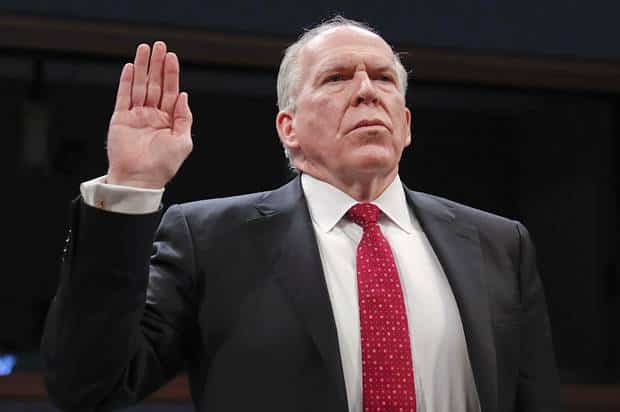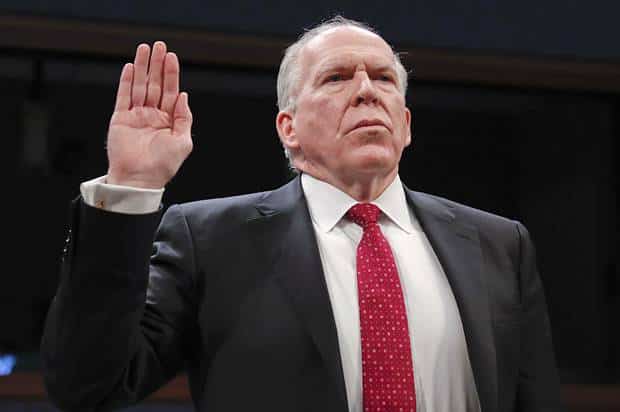The Washington Post and a number of other mainstream media outlets are sensing blood in the water in the wake of former CIA Director John Brennan’s public testimony before the House Intelligence Committee. The Post headlined a front page featured article with Brennan’s explosive testimony just made it harder for the GOP to protect Trump. The article states that Brennan during the 2016 campaign “reviewed intelligence that showed ‘contacts and interaction’ between Russian actors and people associated with the Trump campaign.” Politico was also in on the chase in an article entitled Brennan: Russia may have successfully recruited Trump campaign aides.
The precise money quote by Brennan that the two articles chiefly rely on is “I encountered and am aware of information and intelligence that revealed contacts and interactions between Russian officials and US persons involved in the Trump campaign that I was concerned about because of known Russian efforts to suborn such individuals. It raised questions in my mind whether or not Russia was able to gain the co-operation of those individuals.”
Now first of all, the CIA is not supposed to keep tabs on American citizens and tracking the activities of known associates of a presidential candidate should have sent warning bells off, yet Brennan clearly persisted in following the trail. What Brennan did not describe, because it was “classified,” was how he came upon the information in the first place. We know from the New York Times and other sources that it came from foreign intelligence services, including the British, Dutch and Estonians, and there has to be a strong suspicion that the forwarding of at least some of that information might have been sought or possibly inspired by Brennan unofficially in the first place. But whatever the provenance of the intelligence, it is clear that Brennan then used that information to request an FBI investigation into a possible Russian operation directed against potential key advisers if Trump were to somehow get nominated and elected, which admittedly was a longshot at the time. That is how Russiagate began.
But where the information ultimately came from as well as its reliability is just speculation as the source documents have not been made public. What is not speculative is what Brennan actually said in his testimony. He said that Americans associated with Trump and his campaign had met with Russians. He was “concerned” because of known Russian efforts to “suborn such individuals.” Note that Brennan, presumably deliberately, did not say “suborn those individuals.” Sure, Russian intelligence (and CIA, MI-6, and Mossad as well as a host of others) seek to recruit people with access to politically useful information. That is what they do for a living, but Brennan is not saying that he has or saw any evidence that that was the case with the Trump associates. He is speaking generically of “such individuals” because he knows that spies, inter alia, recruit politicians and the Russians presumably, like the Americans and British, do so aggressively.
At a later point in his testimony Brennan also said that “I had unresolved questions in my mind about whether or not the Russians had been successful in getting U.S. persons, involved in the campaign or not, to work on their behalf, again, either in a witting or unwitting fashion,” clearly meant to imply that some friends of Trump might have become Russian agents voluntarily but others might have cooperated without knowing it. It is a line that has surfaced elsewhere previously, most notably in the demented meanderings of former acting Director of Central Intelligence Michael Morell. As the purpose of recruiting an intelligence agent is to have a resource that can be directed to do things for you, the statement is an absurdity and Brennan and Morell, as a former Director and acting Director of the CIA, should know better. That they don’t explains a lot of things about today’s CIA.
Brennan confirms his lack of any hard evidence when he also poses the question “whether or not Russia was able to gain the co-operation of those individuals.” He doesn’t know whether the Americans were approached and asked to cooperate by Russian intelligence officers and, even if they were, he does not know whether they agreed to do so. That means that the Americans in question were guilty only of meeting and talking to Russians, which was presumably enough to open an FBI investigation. One might well consider that at the time and even to this day Russia was not and is not a declared enemy of the United States and meeting Russians is not a criminal offense.
In his testimony, Brennan also hit the main theme that appears to be accepted by nearly everyone inside the beltway, namely that Russian sought to influence and even pervert the outcome of the 2016 election. Interpreting his testimony, the Post article asserts that “Russia was engaged in an ‘aggressive’ and ‘multifaceted ‘effort to interfere in our election.” As has been noted frequently before, even though this assertion has apparently been endorsed by nearly everyone in the power structure AKA (also known as) “those who matter,” it is singularly lacking in any actual evidence.
Nor has any evidence been produced to support the claim that it was Russia that hacked the Democratic National Committee (DNC) server, which now is accepted as Gospel, but that is just one side to the story being promoted. Last Wednesday, the New York Times led off its front page with a piece entitled Top Russian Officials Discussed How to Influence Trump Aides Last Summer. Based, as always, on anonymous sources citing “highly classified” intelligence, the article claimed that “American spies collected information last summer revealing that senior Russian intelligence and political officials were discussing how to exert influence over Donald J. Trump through his advisers…” The “discussions,” which are presumably NSA intercepts of phone calls, reportedly focused on two aides in particular, Paul Manafort and Michael Flynn, both of whom had established relationships with Russian businessmen and government officials.
The article goes on to concede that “It is unclear, however, whether Russian officials actually tried to directly influence Mr. Manafort and Mr. Flynn…,” and that’s about all there is to the tale, though the Times wanders on for another three pages, recapping Brennan and the Flynn saga lest anyone has forgotten. So what do we have? Russians were talking on the phone about the possibility of influencing an American’s presidential candidate’s advisers, an observation alluded to by Brennan and also revealed in somewhat more detail by anonymous sources. Pretty thin gruel, isn’t it? Isn’t that what diplomats and intelligence officers do?
It would appear that the New York Times’ editors are unaware that the United States routinely interferes in elections worldwide and that the action taken in various places including Ukraine goes far beyond phone conversations. In some other places like Libya, Syria, Iraq, Somalia and Afghanistan the interference is particularly robust taking place at the point of a bayonet, but the Times and Washington Post don’t appear to have any problem when the regime change is being accomplished ostensibly to make the world more democratic, even if it almost never has that result.
How one regards all of the dreck coming out of the Fourth Estate and poseurs like John Brennan pretty much depends on the extent one is willing to trust that what the government, its highly-politicized bureaucrats and the media tell the public is true. For me, that would be not a lot. The desire to bring down the buffoonish Donald Trump is understandable, but buying into government and media lies will only lead to more lies that have real consequences, up to and including the impending wars against North Korea and Iran. It is imperative that every American should question everything he or she reads in a newspaper, sees on television “news” or hears coming out of the mouths of former and current government employees.
Reprinted with author’s permission from Unz Review.


